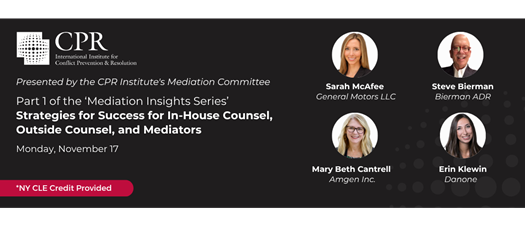Mediator Selection Beyond the Usual Suspects: 'Mediation Insights' Part 1
Join Us Virtually
Event Details
Please make sure to register in advance.
Part 1: Mediator Selection Beyond the Usual Suspects
- Steve Bierman, Mediator, Arbitrator, and Mediation Committee Co-Chair, Bierman ADR
- Sarah McAfee, Lead Counsel of Product Litigation, General Motors
- Mary Beth Cantrell, Senior Associate General Counsel, Amgen Inc.
- Erin Klewin, Senior Litigation Counsel, Danone
This initial session will explore navigation of mediation selection, including:
- What qualities, experience, and intangibles should counsel look for?
- If interviewing mediators for selection, what questions should counsel ask?
- When reviewing mediator resumes, are there any “tells”?
- If selection is case-dependent, what case factors should counsel consider? How do those factors affect the selection process?
-
How to use the CPR DRS website for selection?
Contact Micah Seigel at mseigel@cpradr.org with any questions or to obtain assistance registering.
Read below for information about upcoming events in this series. Please note that dates and speakers for these events have not yet been announced. Please check back on this page for more information and look for email updates.
Part 2: From Adversarial to Collaborative: Leveraging the Mediator as a Negotiation Coach
This session explores the shift from a combative litigation posture to a collaborative mediation mindset and how to use the mediator to support that transition.
- How pre‑mediation conferences and preparation set expectations and build trust
- How the mindset shift changes mediation submissions, opening offers, and responses
- Using the mediator as a negotiation coach to shape strategy throughout the day
- Practical frameworks for aligning advocacy with settlement goals, not trial narratives
Part 3: The Nuts and Bolts of Distributive Bargaining
Once the pie is defined, this program focuses on how to divide it effectively using disciplined distributive bargaining tools.
- Crafting opening offers, setting a credible range, and resisting anchoring by extreme positions
- The role of the midpoint in planning concession strategies (and its limits)
- Designing and interpreting brackets to signal movement without over‑committing
- Using the mediator to read bargaining dynamics and test hypotheses safely
Part 4: Closing the Deal, Beyond the Numbers
Explore the non‑monetary levers and standard terms that make or break settlements, and how to move efficiently from handshake to paper.
- Identifying and prioritizing non‑monetary terms (especially where relationships continue)
- Calibrating “typical” provisions—releases, indemnification, confidentiality, non‑disparagement, and more
- Converting an oral understanding into a clear term sheet, then into final documents
- Avoiding drafting pitfalls, sequencing decisions, and managing last‑mile risk


